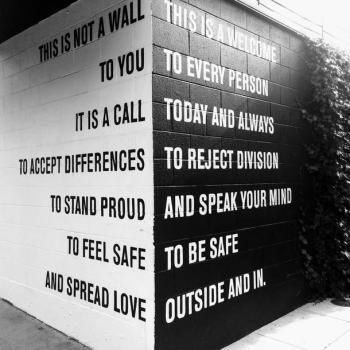In the public square of opinion, just about anything goes these days. We no longer simply recognize diversity, we celebrate it. We don’t just acknowledge our differences, we embrace them. What was once fringe is mainstream.
As a Christian White Male, I’m told quite clearly that I “must tolerate” everyone and everything. However, I am finding that I am no longer tolerable by others.
Some of it is a rebound from hundreds of years of single-race, single-religion rule in a nation founded by people who they themselves were running from intolerance. In a twisted way, I guess I had my chance to speak – through the previous generations of majority – and now it’s my turn to take the lumps of silence.
If one were simply using the worst examples from history as predictors of the future, perhaps Christianity isn’t so tolerant. We have purged, persecuted and gone to war over our absolutes.
But countering that are the best examples from history, when people of faith minister to the hungry, the oppressed, the lost, and the “least of these.” These are the times when we rightly tolerate the sinner apart from the sin.
Defining tolerance
As we discuss – and defend – our tolerance, it’s helpful to sort out the various perceptions around the word.
In the Compact Guide to World Religions, Rick Rood writes an adaptation of Dr. Erwin Lutzer’s observations about tolerance:
- “Legal” tolerance: The recognition that each person has the legal right to believe whatever he or she determines is true or best.
- “Social” tolerance: The recognition that people ought to be treated with dignity and respect regardless of their religious beliefs.
- “Uncritical” tolerance: The notion that no religious belief should be evaluated as being false or inferior to any other religious belief. All religious believed should be granted equal status as a claim to truth.
By these definitions, I am definitely legally tolerant. My libertarian mind thinks that people should be able to choose what they want. And that fits into my worldview as well, as God has granted free will.
And I’m socially tolerant. I regularly spend time with people Not Like Me. I don’t embrace their differences, but I certainly understand their choice and try to live in peace with them.
But I am not an “uncritical tolerant.” I can’t have multiple truths cancelling each other without stripping the word of all meaning.
It is this last definition that constricts me, that keeps me from having a place at the table of ideas. It all comes down to a belief system that is based on absolutes.
What’s wrong with having an absolute?
The reason we are called narrow is because Christians dare to define truth. There is right. There is wrong. Admittedly, my spirit is often spent parsing out the gray, finding the shades in which to hide. But when all the excuses are torn away I am still left with the same bottom line.
While we turn from clear-cut answers in the matters of living, we readily accept them in the natural world. We acknowledge the truth of gravity. We understand the temperature rise in the fire’s flame. We do not grapple with the difference between solid and liquid. Math and geometry have definite answers with no room for error.
A belief system that isn’t fuzzy alienates us from a world that is systematically allowing absolutes to be demolished. If every person gets to define their own truth, their own definition of right and wrong, the result is anarchy.
Paul observed that men would “exchange truth for a lie,” and in the end times we would long to surrounded by teachers who would cater to own desires, “tickling our ears.”
The problem with having what I believe to be “The Answer,” puts me in a position where someone is wrong. And today, that’s just not tolerable.
Not Like Me
When it comes to having the capacity of respecting and recognizing the belief – or nonbelief – of others, a tolerant person will acknowledge that there are others who are different.
I’ve embarked on a year-long quest to find people who are “Not Like Me,” and you’ll be reading about that journey in this space. I’m doing this because I recognize that I am a middle-aged, white, suburban man who hasn’t really always seen the world in reality. So I’m reaching out — on purpose – to find people who are different, to expand my world.
So far, I’ve taken two trips to the Middle East in hopes of understanding the Arab Christian mind, and to bring back to America a different view of those who live in this region.
I’ve also had conversations with Wiccans, Muslims, a older woman who has endured a lifetime of abuse, young black males, an older black woman who lived through segregation, a millennial who lost his faith, a liberal who once was a conservative, and others.
My motives have been questioned and I’ve been attacked for even daring to ask the question, “What makes you different?” The attacks haven’t come from “narrow, bigoted Christians,” but from those who doubt my sincerity.
Maybe it’s because of the proliferation of “friendship evangelism,” the hidden tricks that some play on the unsuspecting. But not every Christian has Conversion Crowbar hidden up their sleeve.
Intolerant Jesus
Billy Graham wrote an article for Christianity Today in 1959, where he called intolerance one of the “pet words of this age.”
Here we are 57 years later and we are still grappling.
He acknowledged the word “implies the compromise of one’s convictions, a yielding of ground upon important issues.”
He ticks off the societal tolerance of divorce, alcohol use, crime, immorality, godlessness, and “wickedness in high places” among other things. “They have made us soft, flabby and devoid of conviction. We have become tolerant of unbelief.”
So yes, in the strictest sense, Christians are intolerant.
But we first learned it from Jesus.
He gave this very “bigoted” statement: “I am the way, the truth and the life.” And then He followed up with an either/or choice. The broad road, one where anything goes and everyone mob rushes the exit. Or the narrow road, where a few find their way to life.
“What is truth?” The question Pilate spit out at Jesus wasn’t an inquiry; it was a rejection of the core message of the Savior.
The worldview of Jesus was narrow and distinct. He said there two kingdoms, two paths, two decisions, two destinies. Any other rendering of his words to create a wider scope is simply not dealing honestly with his words. So, we are forced to react to what he said.
Tolerating the Sinner
But there was always a divider in Jesus’ approach, calling out the systems that destroy apart from those who were being destroyed. He was a Legal and Social Tolerant. But he was not an Uncritical Tolerant. Jesus loved the adulterous woman, even removing the social stigma of her actions, but he still told her to “sin no more.”
Ellen White in Steps to Christ wrote, “He did not censure human weakness. He spoke the truth, but always in love. He denounced hypocrisy, unbelief, and iniquity; but tears were in His voice as He uttered His scathing rebukes.”
He was both intolerant and tolerant at the same time. And I think we should follow his example.
I don’t always do a good job of separating out the sinner from the sin. It’s easy to fall into the trap of painting with broad brushes, of calling out those who don’t live up to my rules.
But then I find those on the other side of God’s standard sometimes take it personally. And as His messengers, we are accused of hate because we hold on to a higher standard. They don’t understand how we can splice out individual actions from the individual.
This delicate dance with love and truth isn’t one that is easily choreographed. Each side steps on each other’s toes until they learn the waltz.
So when I am called Intolerant and Narrow, I don’t need to duck or hang my head. It’s a badge of honor, a distinctive that caused Jesus to suffer and die.
I’m with Him.














